Tuesday Feb 17, 2026
Tuesday Feb 17, 2026
Thursday, 12 October 2023 00:10 - - {{hitsCtrl.values.hits}}

Panel on Russian Civilisation
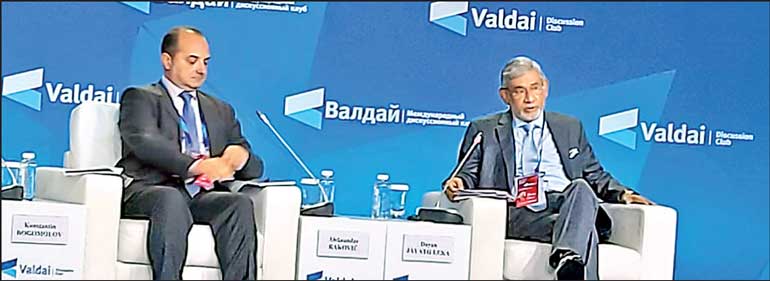
Chairing the panel on Russian Civilisation
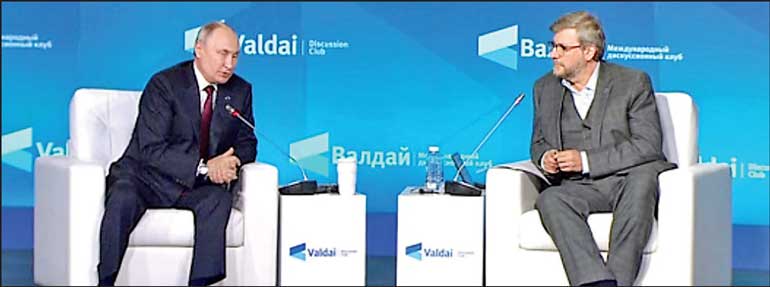
President Putin and anchor Fyodor Lukyanov
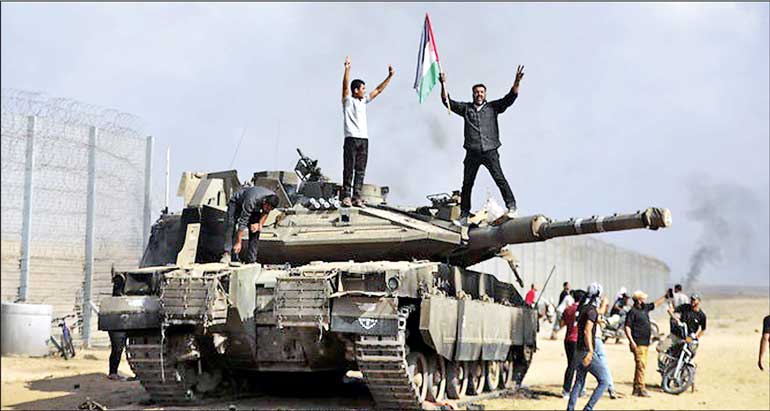
Captured Israeli Merkava tank
“We will turn that
wicked city [Gaza]
into an island of ruins.” – Netanyahu
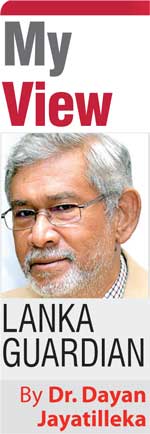 Morally-ethically, in terms of values, the world is cleaved in two. All of us have had to pick a side.
Morally-ethically, in terms of values, the world is cleaved in two. All of us have had to pick a side.
“I have declared a complete siege…No food, no water, no electricity, no fuel, no gas…we are fighting human animals” announced the Israeli Defence Minister, while simultaneously pulverising Gaza with unprecedented ferocity from the air. This is collective punishment along Nazi lines. Gaza is the Warsaw Ghetto of our time.
UNSG Antonio Guterres expressed ‘deep distress’ at Israel’s ‘total siege’ and called for humanitarian aid to be delivered.
The US which would usually have despatched a high-powered peace envoy to the region, instead sent a naval carrier strike group into the Eastern Mediterranean to support Israel.
The guardian of ‘humanitarian values’ the EU announced a cutoff of funds to the Palestinians.
More rationally, Russia blamed the violence on the non-creation of a Palestinian state, while China called for de-escalation by both sides. China and Russia called for a ceasefire and return to negotiations.
Youth demonstrated for Palestine in New York, Washington, Sydney and at Celtic football matches.
Netanyahu and Israel’s right-wing political elite have tried over decades to deny the possibility, ever, of a Palestinian state as agreed upon in the Oslo accords, and to make the Occupation permanent, even eternal, on the ground and in the collective consciousness. But there is no peace without justice.
President Jimmy Carter was among the first to designate the situation in Israel as quintessentially that of apartheid. The young Hamas fighters have shown that the Occupation will always be resisted and never accepted as normal; that someday, like the South African people who overthrew the yoke of apartheid, the Palestinians too will have a state to call their own.
Israel may bomb and starve Gaza, invade it with 4 divisions of mobilized reservists, and bury a great many resistance fighters under the rubble, but it can never kill the Resistance.
It’s the occupation, stupid!
My first piece in print was as a primary schoolkid in the St Joseph’s College magazine, and captioned ‘I saw the Holy Land’. A knowledgeable fan of the IDF victory over the Arab states in the Six-Day War, I loved the kibbutzim, had barely hefted the Uzi with the bulky wooden stock, and cherished the personally autographed (with a black felt-pen) photograph of Moshe Dayan my father brought back to our room in Tel Aviv’s Dan Hotel, having mentioned his only son’s name to Israel’s most iconic General.
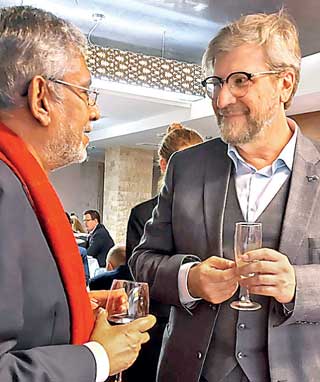 |
| With Prof. Fyodor Lukyanov |
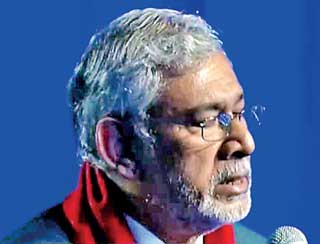 |
| Q/A with President Putin |
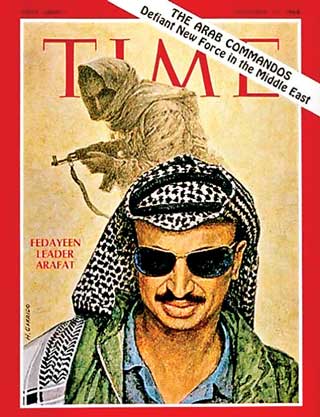 |
| Palestinian guerrillas arise, 1968 |
I tore up that autographed black-and-white photo the month I turned 12 in 1968. My epiphany came with the Battle of Karameh in the Jordan valley where Yasser Arafat led a Fatah guerilla force of dispossessed Palestinians which frontally resisted 15,000 soldiers and aircraft of the triumphant IDF of the previous year’s Six Day war against the Arab states, inflicting heavy casualties. TIME magazine featured him on the cover on Dec 13th 1968.
With the Occupation, Israel turned from a David fighting the Goliath of the Arab states, into Goliath himself. Since then, the Palestinians have wielded “the sling of David” (Jose Marti).
As an Ambassador, with the concurrence of President Mahinda Rajapaksa (my father’s protégé in the Palestine Solidarity Committee), I was a frontline fighter in two diplomatic victories for Palestine: the UNHRC Geneva Resolution in 2008/9 on the Gaza war, and the dramatic entry of Palestine with more than the mandatory 2/3rds majority, into UNESCO Paris in 2011. Gotabaya Rajapaksa confessed to the Indian High Commissioner that he (abjectly) “flew to Tel Aviv to explain”.
Just as Karameh was my epiphany, I can imagine the motivational-mobilizational impact upon generations of Palestinians of the images of Hamas resistance fighters atop the ‘world’s best’ Israeli Merkava Mk 4 battle tanks they had disabled and captured on Oct 7th 2023, shattering the myth of Israeli invincibility.
The Hamas ‘flood’ does not fall neatly into the category of ‘terrorism against a legitimate state’. The question of Palestine is historically and centrally one of invasion-annexation-Occupation; prolonged illegal Occupation made permanent through waves of illegal settlements. While the state of Israel has an inalienable right to exist, the current borders of the state of Israel are illegal and illegitimate.
The ‘flood’ came after years of deliberate Israeli policy of murdering unarmed civilians –over 250 civilians including women nurses were systematically killed by IDF snipers when marching peacefully towards the border fence—shooting to death a total of 50 children in the streets, vicious attacks by mobs of armed settlers on neighbouring Palestinian villages in the West Bank, the IDF’s unpunished murder of journalist Shireen Abu Akleh, and the religio-cultural-existential humiliation of Palestinians by the deliberate desecration of the Al Aqsa mosque.
In a settler-colonial state, civilians are not perceived by the occupied merely as innocent non-combatants, because they are heavily armed, aggressive encroachers in occupation of lands stolen from the native people who were born and bred there but have been evicted at gunpoint for generations.
Humanity has been here before, in the case of Algeria in the early 1960s, when the FLN hit French settler-colonial targets. This violence was deeply discussed, most indelibly by Frantz Fanon, endorsed by Jean-Paul Sartre. Albert Camus criticized FLN tactics saying he didn’t want his mama, a French settler, killed or injured.
Those who are appalled by Al Aqsa Flood, launched in despair, defiance and determination by Hamas, would have been appalled by the slave revolt of Spartacus.
Putin up close
From my assigned seat in the front row in the auditorium of a ski resort in Sochi on October 5th 2023, yards away from President Putin for over 3 ½ hours, it was clear that everything I had read in the quality Western media was way off the mark. Putin was not unwell to a point of dysfunctionality, woodenly inexpressive in manner, out of touch, hostage of a bureaucratic elite, not in charge, given to irrational anger, or prone to eccentric behavior.
He was the confident leader of his country, providing a lucidly realist explanation of its challenges and conduct. Open to questioning on all subjects without taboos from an audience of over 100 delegates from 42 countries, he intervened to permit all questions when Prof Fyodor Lukyanov, anchoring, thought to wind up the session in three hours.
Live-streamed and widely covered on all Russian TV newscasts, the public heard the questions, saw the frankness with which they were posed and the extensive dialogic engagement by Putin. This was far from a closed presidency and closed-off President.
For someone supposedly losing a war and facing the fall of his regime if not the crack-up of Russia, Putin presented a portrait of unruffled determination and long-range optimism, the reasons for which he revealed in his speech and returned to in his responses.
The determination comes from his awareness of his stewardship of the world’s largest country with what he calls a ‘state civilization’. Russia is too big, too old, too long, too continuous, too deep, to lose to the Ukrainians and their patrons ‘the collective west’, i.e., NATO. Putin is ultimately relying on the combination of size and spiritual fibre of Russia, to be the source of strength which makes his country indomitable and capable of prevailing ultimately.
Despite massive infusion of Western armaments and the West’s instruction to Ukraine that the counter-offensive should be prosecuted “whatever the cost”—which he says is a direct quote from a Western injunction to Ukraine’s leaders—Ukraine’s counteroffensive has been underwhelming.
According to Putin, since July 24th 2023, Ukrainian army casualties are close to 90,000 killed and wounded, with over 500 tanks and armoured vehicles lost. The overall implication was that the Ukrainian counteroffensive had lost momentum in the Russian ‘meatgrinder’. Time was NOT working on the side of the Ukrainians and NATO, and the Ukrainian armed forces would be crippled by high attrition rates, with their war effort reaching the tipping point of unsustainability.
Putin was less guarded about the non-military factors, chiefly the increasing salience of BRICS, now in an expansion mode, and G20, with the West’s anti-Russian agenda neutralized by India’s leadership. He seemed delighted by the way that the world economy was evolving in the direction of multipolarity, not least as blowback against the arbitrariness of unilateral western sanctions and weaponization of the dollar.
In Putin’s perspective, the world order is manifestly evolving in a multipolar direction. The West will be unable to prevail in the Ukraine, and more generally, because it is trying to hold back the inexorable evolution of the world system quite like it resisted the tide of de-colonization at an earlier stage.
In sharp contrast to President Wickremesinghe’s typical temper tantrum towards the Deutsche Welle interviewer, came President Putin’s response to Prof Radhika Desai’s polite yet pointed protest against the arrest and imminent trial of the well-known Marxist intellectual Boris Kargalitsky (over an FB post on the war) and her request to present the Russian leader a signed petition for his release. Putin didn’t pushback or stonewall. Instead, he readily agreed to accept and study Radhika’s petition.
Vladimir Putin engaged substantively with my frontal question.
Dayan Jayatilleka:
“Since you are being attacked by imperialism and elements of fascism, and since in history those were fought and defeated by Communists of China, North Korea and Vietnam, and since the best text about imperialism was written by Lenin, is it the right time to perhaps be less critical about 1917 and restore it to a historical status like the American Revolution, the French Revolution, and the Chinese Revolution?”
President Putin:
“Well, being less critical of the events of those years including being less critical in Russia itself? Yes, I believe you are quite right. In a certain sense we need to do less criticizing and go more into the scientific analysis of the realities of that time and of our age. Yes, you are right, but we should give deeper evaluations. We should talk about the ideological aspects, and this is my personal view here and all of you present here may argue with me. We should give the right evaluations of the ideological aspects of the interstate relations and the geopolitical interests, apart from the relations between the classes, the relations within the so-called class struggle.
Even following 1991 after the collapse of the Soviet Union, we were still living in the paradigm of class and ideological relations, and we were not seeing the geopolitical interests.
Take a look at the relations with the People’s Republic of China. Take a look at China and the West. At a certain point they [the West] were trying to instigate a conflict between China and the Soviet Union. China itself was weak back then. They [the West] did not have any fear. But now China is rising under the leadership of the Communist Party and President Xi. The power of China is rising day by day. So now the situation is different. Now the West is reverting. Back when the West was trying to use China they forgot about their ideological differences. But now they are going back and trying to restore those differences. But essentially the politics of the United States regarding China is based on geopolitics. The rising power of China is what intimidates the West, rather than the human rights abuses or the rights of national minorities. Is that a real concern for anyone? No, that is merely a tool of the fight against China. The same goes for the relations with Russia.
In general, globally, yes, I think we should give a deeper analysis and deeper evaluations, and at least I can agree with you and say that we should not throw our history away. We should not ignore everything that happened under the Communist parties of that time and the period that you mentioned. We should not paint everything with the same colours. That would be harmful. And this point, I agree with you.”
The leading Russian TV station RT carried the Q/A in full, and the video was embedded in a tweet (X) from what I’ve been told appears to be a Latin American ‘handle’.
https://x.com/upholdreality/status/1709970417832571204?s=48&t=hI1CTgdaMaL1h3YJujkRng
Which other world leader, helming a nuclear superpower, would engage this substantively with a delegate from the global South, on a sensitive ‘internal’ historical issue?
Which Sri Lankan leader would or could even come close?
Universality or Civilisation
Co-authored by 5 stellar scholars (Fyodor Lukyanov, Oleg Barabanov, Timofei Bordachev, Andrey Sushentsov and Ivan Timofeev) the annual report of the Valdai Discussion Club was entitled ‘Maturity Certificate or The Order That Never Was: Fantasy of a Hierarchy-Free Future’.
A crucial paragraph spotlighted a new foreign policy concept. I was chosen to moderate the first-ever thematic panel at Valdai on it.
 “…A third line of opposition began to be clearly seen in Russia’s stance: the denial of norm-and value-based imperatives postulated by western countries as the main constraints in the structure of international (and domestic) politics. Hence the narrative about opposing sovereignty and universalism. Appeals to history have become increasingly frequent to assert the uniqueness of each nation and state and therefore, the impossibility of universal rules and values…” (p 11)
“…A third line of opposition began to be clearly seen in Russia’s stance: the denial of norm-and value-based imperatives postulated by western countries as the main constraints in the structure of international (and domestic) politics. Hence the narrative about opposing sovereignty and universalism. Appeals to history have become increasingly frequent to assert the uniqueness of each nation and state and therefore, the impossibility of universal rules and values…” (p 11)
In my remarks as moderator, I opposed the antithetical counter-positioning of ‘civilization’ vs ‘universalism’ and proposed a critical synthesis. Well-known Brazilian roving correspondent and author Pepe Escobar summed up the discussion and my input:
‘…What’s clear is that the collective West’s “universality” is not valid anymore. A remarkable panel on ‘Russian Civilization Through the Centuries’ showed how the notion of “universality” actually entered Western civilization through St Paul - after his Damascus moment - whereas the Indian notion of equilibrium inbuilt in the Upanishads would be way more appropriate.
Still, we are now in hot debate over the notion of the “civilization-state”, as configured mostly by India and China, Russia and Iran.
Beyond Valdai, and especially throughout the crucial year of 2024 - while Russia holds the presidency of BRICS - there will be much further discussion about “poles” of ancient civilizations. A broad coalition of states that support multipolarity actually do not support the “civilization” concept; instead, they support the notion of people’s sovereignty.
It was up to Dayan Jayatilleka, former Sri Lankan plenipotentiary ambassador to Russia, to come up with a brilliant formulation.
He showed how Vietnam faced a war against the hegemon successfully – “using 5,000 years of Vietnamese civilization”. That was “an internationalist phenomenon”. Ho Chi Minh took his ideas from Lenin – while enjoying full support from students in the US and Europe. Russia might therefore learn from the Vietnamese experience how to conquer young hearts and minds across the West for its quest towards multipolarity…’
(Pepe Escobar: Putin and the Magic Multipolar Mountain
(sputnikglobe.com))
For those interested in this crucial conceptual and strategic question, the entire panel discussion can be viewed here.
https://vk.com/video-214192832_456239125
For my post-panel interview, see:
Dayan Jayatilleka on International Aspects of Civilisation State Concept — Valdai Club